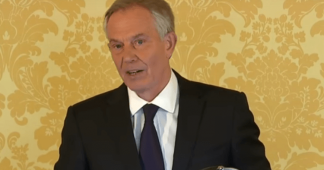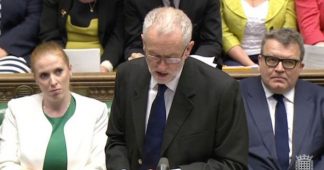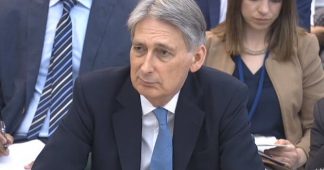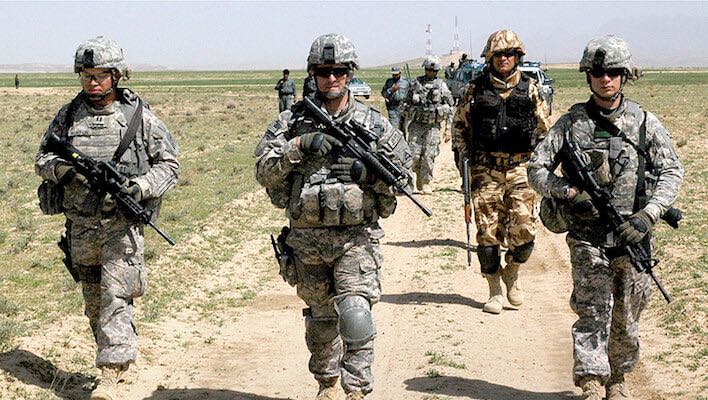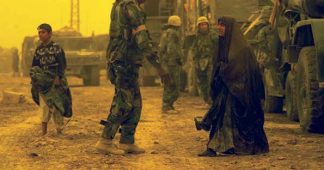Sir John Chilcot’s public statement, 6 July 2016
We were appointed to consider the UK’s policy on Iraq from 2001 to 2009, and to identify lessons for the future. Our Report will be published on the Inquiry’s website after I finish speaking.
In 2003, for the first time since the Second World War, the United Kingdom took part in an invasion and full-scale occupation of a sovereign State. That was a decision of the utmost gravity. Saddam Hussein was undoubtedly a brutal dictator who had attacked Iraq’s neighbours, repressed and killed many of his own people, and was in violation of obligations imposed by the UN Security Council.
But the questions for the Inquiry were:
- whether it was right and necessary to invade Iraq in March 2003; and
- whether the UK could – and should – have been better prepared for what followed.
We have concluded that the UK chose to join the invasion of Iraq before the peaceful options for disarmament had been exhausted. Military action at that time was not a last resort.
We have also concluded that:
- The judgements about the severity of the threat posed by Iraq’s weapons of mass destruction – WMD – were presented with a certainty that was not justified.
- Despite explicit warnings, the consequences of the invasion were underestimated. The planning and preparations for Iraq after Saddam Hussein were wholly inadequate.
- The Government failed to achieve its stated objectives.
I want now to set out some of the key points in the Report.
First, the formal decision to invade Iraq, if Saddam Hussein did not accept the US ultimatum to leave within 48 hours, was taken by Cabinet on 17 March 2003. Parliament voted the following day to support the decision.
The decision was, however, shaped by key choices made by Mr Blair’s Government over the previous 18 months – which I will briefly set out.
After the attacks on 11 September 2001, Mr Blair urged President Bush not to take hasty action on Iraq.
By early December, US policy had begun to shift and Mr Blair suggested that the US and the UK should work on what he described as a “clever strategy” for regime change in Iraq, which would build over time.
When Mr Blair met President Bush at Crawford, Texas, in early April 2002, the formal policy was still to contain Saddam Hussein. But, by then, there had been a profound change in the UK’s thinking:
- The Joint Intelligence Committee had concluded that Saddam Hussein could not be removed without an invasion.
- The Government was stating that Iraq was a threat that had to be dealt with. It had to disarm or be disarmed.
- That implied the use of force if Iraq did not comply – and internal contingency planning for a large contribution to a military invasion had begun.
At Crawford, Mr Blair sought a partnership as a way of influencing President Bush. He proposed a UN ultimatum to Iraq to readmit inspectors or face the consequences.
On 28 July, Mr Blair wrote to President Bush with an assurance that he would be with him “whatever” – but, if the US wanted a coalition for military action, changes would be needed in three key areas. Those were:
- progress on the Middle East Peace Process;
- UN authority; and
- a shift in public opinion in the UK, Europe and the Arab world.
Mr Blair also pointed out that there would be a “need to commit to Iraq for the long term”.
Subsequently, Mr Blair and Mr Straw urged the US to take the issue of Iraq back to the UN. On 7 September, President Bush decided to do so.
On 8 November, resolution 1441 was adopted unanimously by the Security Council. It gave Iraq a final opportunity to disarm or face “serious consequences”, and it provided for any further breaches by Iraq to be reported to the Security Council “for assessment”. The weapons inspectors returned to Iraq later that month.
During December, however, President Bush decided that inspections would not achieve the desired result; the US would take military action in early 2003.
By early January, Mr Blair had also concluded that “the likelihood was war”.
At the end of January, Mr Blair accepted the US timetable for military action by mid-March. To help Mr Blair, President Bush agreed to seek a further UN resolution – the “second” resolution – determining that Iraq had failed to take its final opportunity to comply with its obligations.
By 12 March, it was clear that there was no chance of securing majority support for a second resolution before the US took military action.
Without evidence of major new Iraqi violations or reports from the inspectors that Iraq was failing to co-operate and they could not carry out their tasks, most members of the Security Council could not be convinced that peaceful options to disarm Iraq had been exhausted and that military action was therefore justified.
Mr Blair and Mr Straw blamed France for the “impasse” in the UN and claimed that the UK Government was acting on behalf of the international community “to uphold the authority of the Security Council”.
In the absence of a majority in support of military action, we consider that the UK was, in fact, undermining the Security Council’s authority.
Second, the Inquiry has not expressed a view on whether military action was legal. That could, of course, only be resolved by a properly constituted and internationally recognised Court.
We have, however, concluded that the circumstances in which it was decided that there was a legal basis for UK military action were far from satisfactory.
In mid-January 2003, Lord Goldsmith told Mr Blair that a further Security Council resolution would be necessary to provide a legal basis for military action. He did not advise No.10 until the end of February that, while a second resolution would be preferable, a “reasonable case” could be made that resolution 1441 was sufficient. He set out that view in written advice on 7 March.
The military and the civil service both asked for more clarity on whether force would be legal. Lord Goldsmith then advised that the “better view” was that there was, on balance, a secure legal basis for military action without a further Security Council resolution. On 14 March, he asked Mr Blair to confirm that Iraq had committed further material breaches as specified in resolution 1441. Mr Blair did so the next day.
However, the precise basis on which Mr Blair made that decision is not clear.
Given the gravity of the decision, Lord Goldsmith should have been asked to provide written advice explaining how, in the absence of a majority in the Security Council, Mr Blair could take that decision.
This is one of a number of occasions identified by the Inquiry when policy should have been considered by a Cabinet Committee and then discussed by Cabinet itself.
Third, I want to address the assessments of Iraq’s weapons of mass destruction and how they were presented to support the case for action.
There was an ingrained belief in the UK policy and intelligence communities that:
• Iraq had retained some chemical and biological capabilities;
• was determined to preserve and if possible enhance them – and, in the future, to acquire a nuclear capability; and
• was able to conceal its activities from the UN inspectors.
In the House of Commons on 24 September 2002, Mr Blair presented Iraq’s past, current and future capabilities as evidence of the severity of the potential threat from Iraq’s WMD. He said that, at some point in the future, that threat would become a reality
The judgements about Iraq’s capabilities in that statement, and in the dossier published the same day, were presented with a certainty that was not justified.
The Joint Intelligence Committee should have made clear to Mr Blair that the assessed intelligence had not established “beyond doubt” either that Iraq had continued to produce chemical and biological weapons or that efforts to develop nuclear weapons continued.
The Committee had also judged that as long as sanctions remained effective, Iraq could not develop a nuclear weapon, and that it would take several years to develop and deploy long range missiles.
In the House of Commons on 18 March 2003, Mr Blair stated that he judged the possibility of terrorist groups in possession of WMD was “a real and present danger to Britain and its national security” – and that the threat from Saddam Hussein’s arsenal could not be contained and posed a clear danger to British citizens.
Mr Blair had been warned, however, that military action would increase the threat from Al Qaida to the UK and to UK interests. He had also been warned that an invasion might lead to Iraq’s weapons and capabilities being transferred into the hands of terrorists.
The Government’s strategy reflected its confidence in the Joint Intelligence Committee’s Assessments. Those Assessments provided the benchmark against which Iraq’s conduct and denials, and the reports of the inspectors, were judged.
As late as 17 March, Mr Blair was being advised by the Chairman of the Joint Intelligence Committee that Iraq possessed chemical and biological weapons, the means to deliver them and the capacity to produce them. He was also told that the evidence pointed to Saddam Hussein’s view that the capability was militarily significant and to his determination – left to his own devices – to build it up further.
It is now clear that policy on Iraq was made on the basis of flawed intelligence and assessments. They were not challenged, and they should have been.
The findings on Iraq’s WMD capabilities set out in the report of the Iraq Survey Group in October 2004 were significant. But they did not support pre-invasion statements by the UK Government, which had focused on Iraq’s current capabilities, which Mr Blair and Mr Straw had described as “vast stocks” and an urgent and growing threat.
In response to those findings, Mr Blair told the House of Commons that, although Iraq might not have had “stockpiles of actually deployable weapons”, Saddam Hussein “retained the intent and the capability … and was in breach of United Nations resolutions”.
That was not, however, the explanation for military action he had given before the conflict.
In our Report, we have identified a number of lessons to inform the way in which intelligence may be used publicly in the future to support Government policy.
Fourth, I want to address the shortcomings in planning and preparation.
The British military contribution was not settled until mid-January 2003, when Mr Blair and Mr Hoon agreed the military’s proposals for an increase in the number of brigades to be deployed; and that they would operate in southern, not northern, Iraq.
There was little time to prepare three brigades and the risks were neither properly identified nor fully exposed to Ministers. The resulting equipment shortfalls are addressed in the Report.
Despite promises that Cabinet would discuss the military contribution, it did not discuss the military options or their implications.
In early January 2003, when the Government published its objectives for post-conflict Iraq, it intended that the interim post-conflict administration should be UN-led.
By March 2003, having failed to persuade the US of the advantages of a UN-led administration, the Government had set the less ambitious goal of persuading the US to accept UN authorisation of a Coalition-led interim administration.
When the invasion began, UK policy rested on an assumption that there would be a well-executed US-led and UN-authorised operation in a relatively benign security environment.
Mr Blair told the Inquiry that the difficulties encountered in Iraq after the invasion could not have been known in advance.
We do not agree that hindsight is required. The risks of internal strife in Iraq, active Iranian pursuit of its interests, regional instability, and Al Qaida activity in Iraq, were each explicitly identified before the invasion.
Ministers were aware of the inadequacy of US plans, and concerned about the inability to exert significant influence on US planning. Mr Blair eventually succeeded only in the narrow goal of securing President Bush’s agreement that there should be UN authorisation of the post-conflict role.
Furthermore, he did not establish clear Ministerial oversight of UK planning and preparation. He did not ensure that there was a flexible, realistic and fully resourced plan that integrated UK military and civilian contributions, and addressed the known risks.
The failures in the planning and preparations continued to have an effect after the invasion.
That brings me to the Government’s failure to achieve the objectives it had set itself in Iraq.
The Armed Forces fought a successful military campaign, which took Basra and helped to achieve the departure of Saddam Hussein and the fall of Baghdad in less than a month.
Service personnel, civilians who deployed to Iraq and Iraqis who worked for the UK, showed great courage in the face of considerable risks. They deserve our gratitude and respect.
More than 200 British citizens died as a result of the conflict in Iraq. Many more were injured. This has meant deep anguish for many families, including those who are here today.
The invasion and subsequent instability in Iraq had, by July 2009, also resulted in the deaths of at least one hundred and fifty thousand Iraqis – and probably many more – most of them civilians. More than a million people were displaced. The people of Iraq have suffered greatly.
The vision for Iraq and its people – issued by the US, the UK, Spain and Portugal, at the Azores Summit on 16 March 2003 – included a solemn obligation to help the Iraqi people build a new Iraq at peace with itself and its neighbours. It looked forward to a united Iraq in which its people should enjoy security, freedom, prosperity and equality with a government that would uphold human rights and the rule of law as cornerstones of democracy.
We have considered the post-conflict period in Iraq in great detail, including efforts to reconstruct the country and rebuild its security services.
In this short statement I can only address a few key points.
After the invasion, the UK and the US became joint Occupying Powers. For the year that followed, Iraq was governed by the Coalition Provisional Authority. The UK was fully implicated in the Authority’s decisions, but struggled to have a decisive effect on its policies.
The Government’s preparations failed to take account of the magnitude of the task of stabilising, administering and reconstructing Iraq, and of the responsibilities which were likely to fall to the UK.
The UK took particular responsibility for four provinces in the South East. It did so without a formal Ministerial decision and without ensuring that it had the necessary military and civilian capabilities to discharge its obligations, including, crucially, to provide security.
The scale of the UK effort in post-conflict Iraq never matched the scale of the challenge. Whitehall departments and their Ministers failed to put collective weight behind the task.
In practice, the UK’s most consistent strategic objective in relation to Iraq was to reduce the level of its deployed forces.
The security situation in both Baghdad and the South East began to deteriorate soon after the invasion.
We have found that the Ministry of Defence was slow in responding to the threat from Improvised Explosive Devices and that delays in providing adequate medium weight protected patrol vehicles should not have been tolerated. It was not clear which person or department within the Ministry of Defence was responsible for identifying and articulating such capability gaps. But it should have been.
From 2006, the UK military was conducting two enduring campaigns in Iraq and Afghanistan. It did not have sufficient resources to do so. Decisions on resources for Iraq were affected by the demands of the operation in Afghanistan.
For example, the deployment to Afghanistan had a material impact on the availability of essential equipment in Iraq, particularly helicopters and equipment for surveillance and intelligence collection.
By 2007 militia dominance in Basra, which UK military commanders were unable to challenge, led to the UK exchanging detainee releases for an end to the targeting of its forces.
It was humiliating that the UK reached a position in which an agreement with a militia group which had been actively targeting UK forces was considered the best option available.
The UK military role in Iraq ended a very long way from success.
We have sought to set out the Government’s actions on Iraq fully and impartially. The evidence is there for all to see. It is an account of an intervention which went badly wrong, with consequences to this day.
The Inquiry Report is the Committee’s unanimous view.
Military action in Iraq might have been necessary at some point. But in March 2003:
- There was no imminent threat from Saddam Hussein.
- The strategy of containment could have been adapted and continued for some time.
- The majority of the Security Council supported continuing UN inspections and monitoring.
Military intervention elsewhere may be required in the future. A vital purpose of the Inquiry is to identify what lessons should be learned from experience in Iraq.
There are many lessons set out in the Report.
Some are about the management of relations with allies, especially the US. Mr Blair overestimated his ability to influence US decisions on Iraq.
The UK’s relationship with the US has proved strong enough over time to bear the weight of honest disagreement. It does not require unconditional support where our interests or judgements differ.
The lessons also include:
- The importance of collective Ministerial discussion which encourages frank and informed debate and challenge.
- The need to assess risks, weigh options and set an achievable and realistic strategy.
- The vital role of Ministerial leadership and co-ordination of action across Government, supported by senior officials.
- The need to ensure that both the civilian and military arms of Government are properly equipped for their tasks.
Above all, the lesson is that all aspects of any intervention need to be calculated, debated and challenged with the utmost rigour.
And, when decisions have been made, they need to be implemented fully.
Sadly, neither was the case in relation to the UK Government’s actions in Iraq.
To conclude, I should like to thank my colleagues, our advisers and the Inquiry Secretariat for their commitment to this difficult task.
I also want to pay tribute to Sir Martin Gilbert, who died last year. As one of the pre-eminent historians of the past century, he brought a unique perspective to our work until he became ill in April 2012. We have missed him greatly as a colleague and friend.
